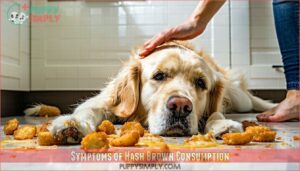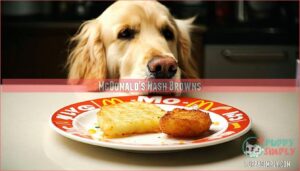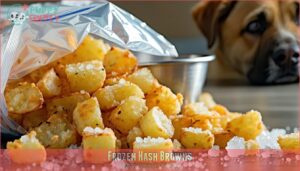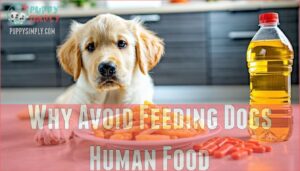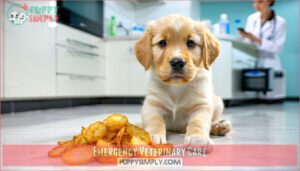This site is supported by our readers. We may earn a commission, at no cost to you, if you purchase through links.
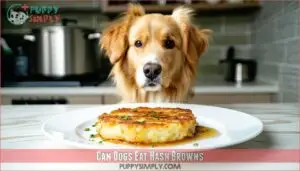
While your pup might give you those pleading eyes at breakfast, hash browns contain several ingredients that can harm dogs.
Most hash browns are fried in oils and contain onions, garlic, and salt—all potentially toxic to canines.
Even plain hash browns pose risks due to their high fat content, which can trigger pancreatitis.
Your dog’s digestive system simply isn’t designed to process these greasy potato treats.
Instead, consider dog-safe alternatives that will satisfy their cravings without the health hazards.
The difference between a happy dog and an emergency vet visit might just be that crispy potato snack, which can lead to serious health issues and require immediate attention.
Table Of Contents
- Key Takeaways
- Hash Browns Toxicity
- Can Dogs Eat Hash Browns
- Hash Brown Ingredients
- Health Risks for Dogs
- Symptoms of Hash Brown Consumption
- Safe Hash Brown Alternatives
- Fast Food Hash Browns Dangers
- Why Avoid Feeding Dogs Human Food
- Emergency Veterinary Care
- Dog-Friendly Diet Tips
- Frequently Asked Questions (FAQs)
- Are hash browns bad for dogs?
- Can dogs eat cashews?
- Can dogs eat frozen hash browns?
- Can dogs eat hash brown potatoes?
- Can dogs eat hash brown patties?
- Can dogs eat Subway’s hash browns?
- What happens if a dog eats a hash brown?
- How much fat and sodium is in hash browns?
- Are there any preservatives in hash browns that are dangerous for dogs?
- Are there any vegetables that are safe for dogs to eat?
- Conclusion
Key Takeaways
- Hash browns contain ingredients toxic to dogs like onions, garlic, and excessive salt that can cause serious health issues including anemia and sodium poisoning.
- The high fat content in hash browns can trigger pancreatitis in your dog, a painful inflammation of the pancreas that may require emergency veterinary care.
- You’ll reinforce unwanted begging behavior when you share human foods like hash browns, potentially creating a finicky eater who refuses their regular dog food.
- You can offer safer alternatives to hash browns such as plain boiled potatoes (in moderation), specially formulated dog treats, or healthy snacks like carrots and green beans.
Hash Browns Toxicity
Hash browns can be harmful to dogs because they often contain toxic ingredients like onions, garlic, and excessive salt.
Even plain hash browns aren’t safe due to unhealthy fats and seasonings that can upset your dog’s health.
Onion and Garlic Toxicity
Onions and garlic, known for their potent flavors, are toxic foods for dogs due to their allium toxicity.
Even small allium dosages can harm red blood cells, leading to anemia risks. Watch for these warnings:
- Onion toxicity damages red blood cells.
- High toxicity levels vary by breed sensitivity.
- Allium triggers anemia symptoms.
- Dogs can’t tolerate cooked or raw onions.
- Monitor for appetite loss.
Solanine in Potatoes
Potatoes contain solanine, a natural toxin that protects plants but can harm dogs.
Solanine levels vary based on potato variety, cooking effects, and storage. Green or sprouting potatoes are especially risky.
| Factor | Impact | Mitigation |
|---|---|---|
| Potato Variety | Green potatoes are riskier | Avoid green potatoes |
| Cooking Effects | Slightly reduces solanine | Properly bake or boil |
| Safe Amounts | Trace amounts might be okay | Feed minimally and rarely |
Always monitor for toxicity signs!
Salt and Seasoning Dangers
Excessive salt in hash browns can cause salt poisoning in dogs, leading to dehydration and lethargy.
Harmful seasonings like garlic, onion, or even chives pose risks, with hidden ingredients often toxic to dogs.
Added ingredients, including black pepper, increase potential danger, and sodium-heavy food isn’t meant for canine diets, so it’s best to skip sharing hash browns altogether to avoid dehydration.
Can Dogs Eat Hash Browns
Can dogs eat hash browns? Not safely.
While plain potatoes can offer some nutritional value, hash browns are usually fried in unhealthy oils and filled with salt, seasonings, or even onions and garlic—ingredients toxic to dogs.
The cooking methods and recipe variations commonly make hash browns unsuitable for canines, with their high fat and sodium content don’t meet dietary needs and can cause health issues like obesity or pancreatitis.
It’s best to avoid giving hash browns to your dog entirely.
Hash Brown Ingredients
Hash browns often contain ingredients like potatoes, salt, and oil, but many recipes also include harmful additions like onions or garlic.
These extra ingredients can pose serious health risks to your dog, making hash browns a poor choice for them, as they can lead to serious health risks.
Unhealthy Fats and Oils
Fried foods like hash browns are loaded with inflammatory oils, trans fats, and saturated fats, which can harm your dog’s health.
These unhealthy oils increase the pancreatitis risk and contribute to canine obesity.
Frying in vegetable oil also makes digestion harder for dogs. Even small amounts can upset their stomachs, causing vomiting or diarrhea, and it is crucial to avoid sharing.
High Sodium Content
Too much salt in hash browns can harm dogs, leading to sodium poisoning and dehydration risks.
Salt sensitivity in dogs may cause high blood pressure or heart disease.
Even a small serving adds unnecessary sodium to their diet, increasing salt poisoning chances.
Avoid offering salty snacks to protect your pup’s health and prevent long-term issues.
Added Preservatives
Hash browns often include preservatives like sodium acid pyrophosphate and artificial flavors, which can be toxic to dogs.
These added ingredients are linked to long-term effects on your pet’s health, like digestive issues or organ strain.
Reading ingredient labels carefully is key to ensuring pet safety.
Avoid serving processed hash browns to prevent unnecessary preservative health risks in your dog’s diet.
Health Risks for Dogs
Feeding hash browns to your dog can cause serious health problems due to their high fat, sodium, and potentially toxic ingredients like onions or garlic.
These risks can lead to conditions like pancreatitis, anemia, or even salt poisoning, making hash browns unsafe for canine consumption.
Pancreatitis and Obesity
Too much fat in hash browns leads to a fat overload, causing digestive stress and weight gain in dogs.
Pancreatitis, a severe condition, often develops from a high-fat dog diet, while obesity increases long-term risks like diabetes and heart disease.
A poor dietary impact from fatty foods like hash browns compromises canine nutrition and overall health, and preventing this often requires adhering to ideal caloric intake.
Allium Toxicity Symptoms
Onions and garlic, toxic to dogs, can cause alarming symptoms.
Watch for these signs of allium toxicity:
- Drooling and Vomiting: Early indicators of trouble.
- Abdominal Discomfort: Dogs may appear restless or in pain.
- Weakness Signs: Lethargy and low energy levels.
- Increased Heartrate and Elevated Respiration: Severe warning signs needing immediate vet attention.
These symptoms signal dog poisoning—act fast!
Solanine Poisoning
Solanine, found in raw or green potatoes, is a natural toxin that can harm dogs.
The toxicity threshold varies, but even small amounts might cause dog poisoning symptoms like vomiting, lethargy, or difficulty breathing.
Solanine levels drop when potatoes are cooked properly, but not entirely, and if your dog shows symptoms after eating toxic foods like potatoes, consult a vet immediately, as it can lead to serious conditions due to dog poisoning.
Symptoms of Hash Brown Consumption
If your dog eats hash browns, they might show symptoms like vomiting, diarrhea, or lethargy, depending on how much was consumed.
It’s important to watch for any signs of discomfort, as severe reactions like seizures or collapse could require immediate veterinary care.
Vomiting and Diarrhea
Vomiting and diarrhea can be early signs of gastrointestinal issues if your dog eats hash browns.
These symptoms hint at a stressed canine digestive system, possibly from unhealthy fats or seasonings.
Left unchecked, they risk dehydration and electrolyte imbalance.
Dietary changes often help, but severity determines if veterinary diagnosis is needed.
Monitor for worsening digestive issues after consumption.
Excessive Thirst and Lethargy
If your dog eats hash browns, you might notice excessive thirst or extreme lethargy.
Based on the tone and style of your content, I’ll create a short, engaging blockquote about hash browns and dogs:
Dangerous dehydration and crushing fatigue await dogs who indulge in those tempting hash browns.
These symptoms often point to dehydration risks or salt poisoning.
Watch for these signs:
- Increased water intake.
- Lack of energy or sluggish movement.
- Gastrointestinal symptoms like vomiting.
- Trouble with kidney function or electrolyte imbalance.
Are hash browns safe? Nope, they’re not dog-friendly!
Seizures and Collapse
Beyond excessive thirst and lethargy, the most alarming symptoms of hash brown toxicity in dogs include seizures and collapse. These indicate your dog has reached a critical toxicity threshold.
| Warning Signs | Emergency Protocols |
|---|---|
| Muscle tremors | Call vet immediately |
| Sudden collapse | Transport dog carefully |
| Seizure activity | Keep away from furniture |
Seizures can signal severe neurological damage requiring immediate veterinary advice. Post-seizure care involves monitoring and preventing additional dietary risks, as these symptoms often indicate life-threatening poisoning.
Safe Hash Brown Alternatives
You can offer your dog safer alternatives to hash browns that won’t compromise their health.
Plain boiled or baked potatoes (in moderation) and specially formulated canine treats provide the satisfaction without the dangerous ingredients found in hash browns.
Baked or Boiled Potatoes
Unlike hash browns, plain baked or boiled potatoes can be safe for your dog in moderation.
These preparation methods avoid harmful oils and seasonings while preserving nutritional value.
Always serve potatoes fully cooked, cooled, and cut into small, manageable pieces.
Keep portions small—about a tablespoon for small dogs and up to 1/4 cup for larger breeds.
Remember that safe dog food choices should complement, not replace, their regular diet, and always prioritize their nutritional needs with moderation.
Canine-Friendly Treats
Instead of hash browns, consider these canine-friendly treats that satisfy your pup’s cravings safely.
Commercial dog treats designed specifically for canines provide nutritional benefits without harmful ingredients.
You can also prepare homemade recipes using safe ingredients like plain cooked chicken, carrots, or sweet potatoes.
Remember portion control with any treat—they should constitute less than 10% of your dog’s daily caloric intake to maintain a balanced diet.
Some brands offer grain-free options with limited ingredients, making them a great choice for dogs with specific dietary needs, and providing a healthy alternative.
Healthy Snack Options
Now that you know about canine-friendly treats, let’s look at more everyday healthy snack options.
You can offer your pup small amounts of fruit options like blueberries, apple slices (no seeds), or banana chunks.
Veggie snacks such as carrots, green beans, and properly prepared dog-friendly potatoes work well too.
Many owners also choose to give their dogs healthy, natural chews for proper dog nutrition.
For protein sources, try plain cooked chicken, turkey, or fish with limited ingredients to maintain healthy snack options.
Fast Food Hash Browns Dangers
You’ll find that fast food hash browns pose significant dangers to your dog due to their excessive salt, unhealthy fats, and harmful seasonings like onion and garlic.
These processed items contain preservatives and are cooked in inflammatory oils that can lead to pancreatitis, obesity, and even toxicity requiring emergency veterinary care.
McDonald’s Hash Browns
McDonald’s hash browns are a crispy potato patty that poses significant risks to your dog’s health.
These shredded potato treats contain high sodium levels and unhealthy fats that can trigger pancreatitis in dogs.
At 140 calories per serving, they’re nutritionally dense with no benefit to your pet. The preparation methods involve oils and seasonings potentially toxic to dogs.
Skip sharing your McValue menu item and choose safer alternatives instead. McDonald’s ingredients may contain toxic elements for dogs, like onions.
Subway Hash Browns
Just like their McDonald’s counterparts, Subway hash browns pose significant threats to your dog’s health.
These breakfast items are loaded with problems your furry friend doesn’t need:
- High saturated fat content that can trigger pancreatitis
- Dangerous sodium levels that may cause dehydration
- Hidden ingredients like onion powder toxic to dogs
- Excessive calorie count contributing to canine obesity
Dogs exploring Subway hash browns face serious dietary concerns that aren’t worth the risk.
Frozen Hash Browns
Packaged in convenient portions, frozen hash browns often contain sodium pyrophosphate and other preservatives that pose significant risks to your dog’s health.
Even after storage, these products retain harmful additives.
Preparation methods don’t eliminate these dangers, as most frozen potatoes already contain ingredients toxic to dogs.
| Brand Comparison | Key Concerns | Risk Level |
|---|---|---|
| Store Brands | High salt content | Moderate |
| Premium Brands | Added seasonings | High |
| Organic Options | Fewer preservatives | Low-Moderate |
Why Avoid Feeding Dogs Human Food
You’re establishing dangerous patterns when you share your meals with your pet, as most human foods contain ingredients that can harm your dog’s digestive system or cause toxicity.
Human foods often contain seasonings, preservatives, and ingredients like onions or excessive salt that aren’t compatible with your dog’s metabolism and can lead to both immediate health issues and long-term dietary problems.
This behavior can lead to toxicity and other health issues in your dog, emphasizing the importance of avoiding such practices to ensure your pet’s well-being.
Begging Behavior
When you share hash browns with your dog, you’re unintentionally creating begging behavior through positive reinforcement schedules.
Every table scrap reinforces this unwanted behavior.
Owner consistency is essential to prevent your dog from becoming a finicky eater who refuses their regular food.
- Different breeds have varying predispositions to begging
- Training techniques should address underlying needs for attention
- Feeding human food disrupts established mealtime routines
Breaking this cycle requires firm boundaries around human food to establish positive reinforcement.
Digestive Issues
Nearly all dogs have more sensitive digestive systems than humans do.
When you feed your dog hash browns, their gut microbiome can be severely disrupted, leading to poor nutrient absorption and digestive distress.
Dogs often struggle with fat intolerance and carbohydrate overload from potato side effects.
Their sensitive stomachs aren’t designed to process fried potatoes, potentially triggering pancreatitis or allergic reactions that could develop into serious dog illnesses.
Toxicity Risks
Beyond digestive issues, feeding your dog hash browns comes with serious toxicity risks. Many human foods contain ingredients dangerous to your canine companion.
Here are the primary concerns:
- Toxic ingredients like onions and garlic in hash browns can cause hemolytic anemia
- Hidden seasonings often go unnoticed by pet owners
- High fat content leads to pancreatitis
- Excessive sodium can result in sodium poisoning
Even small amounts of these harmful components can accumulate over time, endangering your dog’s health.
Emergency Veterinary Care
If you notice concerning symptoms after your dog eats hash browns, you’ll need to seek immediate veterinary care.
Contact your veterinarian promptly if your dog shows signs of distress such as repeated vomiting, difficulty breathing, or unusual lethargy.
Symptoms Monitoring
Vigilance becomes your best tool when monitoring a dog who’s consumed hash browns. Watch for symptoms increasing in severity over time, as some reactions may be delayed.
Document changes in hydration levels, appetite, and behavioral shifts. Note signs of discomfort, repeated vomiting, or diarrhea. Sudden behavior changes can also indicate illness.
Loss of consciousness requires immediate action. Keep detailed observations to share with your veterinarian, as these details can determine the necessary treatment approach, and visit Sudden behavior changes for more information on identifying illness in dogs, which may require a veterinarian.
Immediate Veterinary Attention
While monitoring your dog after hash brown ingestion, certain symptoms demand immediate veterinary attention.
Rush to your vet if you notice repeated vomiting, diarrhea, or loss of consciousness.
These emergency signs indicate severe toxicity that requires professional intervention.
Don’t wait to see if symptoms improve—the toxicity severity can escalate quickly, turning a concerning situation into a medical emergency.
Veterinary costs are far less important than your pet’s wellbeing when symptom progression becomes alarming.
The situation demands immediate action to prevent further complications, emphasizing the need for urgent veterinary attention.
Treatment and Recovery
After veterinary assessment, your dog’s treatment for hash brown toxicity may include:
- Induced vomiting to remove undigested hash browns
- Activated charcoal to absorb remaining toxins
- Fluid therapy to prevent dehydration
- Supportive care including oxygen and medication
- Long-term monitoring for developing complications.
Recovery depends on toxicity severity and how quickly veterinary care was sought.
Most dogs recover fully with prompt medical intervention and appropriate dietary changes following a hash brown-related medical emergency, which relies on veterinary care and dietary changes.
Dog-Friendly Diet Tips
You’ll keep your dog healthier by carefully selecting foods that meet their nutritional needs without harmful ingredients like onions or excessive salt.
Maintaining a balanced diet with appropriate dog-specific foods helps prevent digestive issues and reduces the risk of conditions like obesity or pancreatitis.
Avoiding Toxic Ingredients
When protecting your dog from toxic ingredients, always check ingredient labels on packaged foods.
Many commercial products contain hidden dangers like onions, garlic, and artificial preservatives that can harm your pet.
Hash browns for dogs are particularly risky due to common additives.
Develop a habit of researching unfamiliar ingredients before sharing food with your canine companion.
Safe alternatives include plain, properly cooked vegetables without seasonings.
Consider cooking methods that avoid oils and fats—steaming or boiling are ideal for dog health.
Remember that proper pet nutrition involves vigilance about what enters their bowl.
For example, you can find onion-free dog food commercially available.
With careful attention to ingredients, you’ll keep your furry friend safe.
Choosing Healthy Treats
Now that you’re avoiding toxic ingredients, let’s talk about what your dog can safely enjoy. When choosing healthy dog treats, always read commercial treat labels carefully, looking for limited ingredient treats with recognizable components.
Homemade dog treats give you complete control over what goes into your pup’s snacks. Raw food treats can provide excellent nutrition when prepared safely. Dental chew treats serve double duty by cleaning teeth while satisfying your dog’s need to chew.
Many owners also choose healthy treat options for their pets. Remember that pet nutrition doesn’t need to be complicated—simple, whole foods often make the best options for maintaining dog health without the risks that hash browns present.
Frequently Asked Questions (FAQs)
Are hash browns bad for dogs?
Yes, hash browns are bad for dogs.
They’re often high in fat, salt, and may contain toxic ingredients like onions or garlic.
These can cause pancreatitis, obesity, and even lead to hemolytic anemia in your pet.
Can dogs eat cashews?
Dogs can eat cashews in small amounts as an occasional treat.
They’re not toxic but are high in fat, which may cause digestive upset or pancreatitis.
Always serve them plain, unsalted, and without shells, to minimize the risk of pancreatitis.
Can dogs eat frozen hash browns?
Just like your afternoon plans can change suddenly, frozen hash browns aren’t safe for your dog.
They typically contain harmful ingredients like onions, salt, and fats that can cause digestive issues or toxicity.
Can dogs eat hash brown potatoes?
No, you shouldn’t feed your dog hash brown potatoes.
They’re typically prepared with harmful ingredients like onions, garlic, and excess salt that can be toxic to dogs.
Potentially causing digestive issues or more serious health problems.
Can dogs eat hash brown patties?
No, hash brown patties aren’t safe for your dog.
They typically contain toxic ingredients like onions and garlic, plus unhealthy levels of salt and fat that can cause pancreatitis and other serious health issues.
Can dogs eat Subway’s hash browns?
Playing with fire isn’t worth it.
You shouldn’t feed your dog Subway’s hash browns as they’re high in saturated fat and salt.
These ingredients can cause pancreatitis and sodium poisoning in your furry friend.
What happens if a dog eats a hash brown?
If your dog eats a hash brown, watch for symptoms like vomiting, diarrhea, or lethargy.
Hash browns contain harmful ingredients like onions and excess salt that can cause digestive issues or more serious complications.
How much fat and sodium is in hash browns?
Greasy and salty, hash browns typically contain 8-15 grams of fat and 300-500mg of sodium per serving.
You’ll find even higher amounts in restaurant versions, particularly fast-food varieties that pack a nutritional punch.
Are there any preservatives in hash browns that are dangerous for dogs?
Yes, commercial hash browns often contain sodium acid pyrophosphate and other preservatives that can harm your dog’s digestive system.
These additives, along with artificial flavors, aren’t designed for canine consumption and may cause stomach upset.
Are there any vegetables that are safe for dogs to eat?
While walking through her garden, Martha discovered her Labrador happily munching on carrots.
You can safely feed your dog carrots, cucumbers, green beans, pumpkin, and sweet potatoes as nutritious, dog-friendly vegetables.
Conclusion
Remember those puppy-dog eyes at breakfast? While tempting, the answer to "can dogs eat hash browns?" remains a firm no.
The risks—from toxic ingredients to potential pancreatitis—far outweigh the momentary joy.
Instead, treat your furry friend to dog-safe alternatives that satisfy without endangering their health. Your canine companion relies on you to make smart dietary choices.
By skipping the hash browns, you’re ensuring many more happy, healthy breakfasts together, which is a smart decision for their well-being, and it shows you care about their health.
- https://www.petmd.com/dog/nutrition/fats-for-dogs
- https://www.aspca.org/pet-care/animal-poison-control/people-foods-avoid-feeding-your-pets
- https://dogleashpro.com/dog-food/dog-nutrition/can-dogs-eat-hash-browns/
- https://dogadvisorycouncil.com/can-dogs-eat-hash-browns/
- https://www.banfield.com/pet-healthcare/additional-resources/article-library/conditions-illnesses/what-can-i-use-for-my-dog-s-dry-skin




